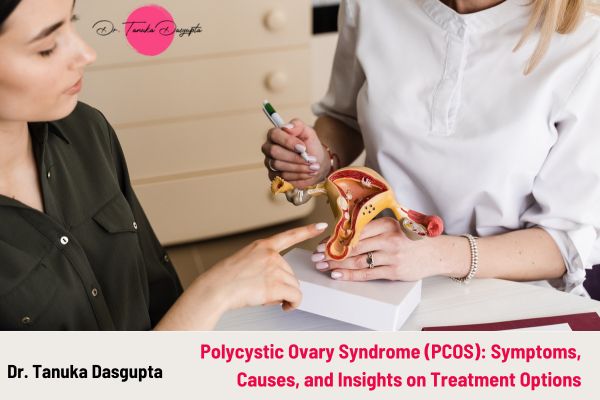Polycystic Ovary Syndrome (PCOS): Understanding Symptoms and Causes with Dr. Tanuka Dasgupta
Polycystic Ovary Syndrome (PCOS) is one of the most common hormonal disorders among women of reproductive age. Despite its prevalence, many women remain unaware of the full spectrum of symptoms, causes, and potential treatment options. In this blog, Dr. Tanuka Dasgupta, a leading gynecologist, explains everything you need to know about PCOS, including how it affects your health, common symptoms, and the best treatment strategies available.
What is PCOS?
Polycystic Ovary Syndrome (PCOS) is a condition in which a woman’s ovaries produce an excessive amount of androgens (male hormones), causing hormonal imbalance. It also leads to the formation of small cysts in the ovaries. This condition can affect a woman’s menstrual cycle, fertility, and physical appearance.
Symptoms of PCOS
PCOS manifests in a range of symptoms that can affect women differently. Some may experience just a few symptoms, while others may face multiple challenges. Common symptoms of PCOS include:
- Irregular Periods: One of the primary symptoms of PCOS is irregular or absent menstrual cycles. Many women experience infrequent periods due to anovulation (lack of ovulation), which can make conceiving difficult.
- Excessive Hair Growth (Hirsutism): Elevated levels of androgens can lead to excessive hair growth on the face, chest, or abdomen. This is a distressing symptom for many women, impacting their self-esteem.
- Acne and Oily Skin: Due to the hormonal imbalance, PCOS often causes acne and oily skin, particularly around the chin, jawline, and upper back.
- Polycystic Ovaries: An ultrasound may show the presence of multiple small cysts on the ovaries, which are typically underdeveloped follicles that failed to release eggs during the menstrual cycle.
- Infertility: PCOS is one of the leading causes of female infertility. Irregular ovulation and hormonal imbalances can interfere with the ability to conceive.
- Weight Gain: Women with PCOS may experience difficulty losing weight and may struggle with weight gain, particularly around the abdominal area.
- Insulin Resistance: PCOS is often associated with insulin resistance, which can cause an increase in blood sugar levels, leading to type 2 diabetes in some cases.
Causes of PCOS
The exact cause of PCOS is not fully understood, but several factors play a role in its development:
- Genetics: If your mother or sister has PCOS, you’re more likely to develop the condition. There seems to be a genetic component to this disorder, which can be passed down through generations.
- Hormonal Imbalance: Women with PCOS typically have elevated levels of androgens, a type of male hormone. This can disrupt ovulation and contribute to symptoms like excessive hair growth and acne.
- Insulin Resistance: Many women with PCOS develop insulin resistance, which means their bodies need more insulin to keep blood sugar levels normal. This can worsen PCOS symptoms and increase the risk of diabetes.
- Low-Grade Inflammation: Chronic low-grade inflammation has been linked to PCOS. This inflammation increases androgen production, contributing to symptoms such as hirsutism, acne, and weight gain.
- Poor Diet and Lifestyle Factors: Unhealthy eating habits, sedentary lifestyle, and stress can exacerbate PCOS symptoms and make it more difficult to manage.
Managing PCOS
While there’s no cure for PCOS, the symptoms can be effectively managed with proper treatment and lifestyle changes. Some common treatment options include:
- Hormonal Birth Control: Birth control pills are often prescribed to regulate menstrual cycles, reduce acne and excess hair growth, and manage other symptoms of PCOS.
- Medications for Ovulation: For women struggling with fertility, medications like Clomid can stimulate ovulation and increase the chances of pregnancy.
- Lifestyle Changes: Maintaining a healthy diet and regular physical activity can help manage insulin resistance, reduce weight gain, and regulate hormones.
- Insulin-Sensitizing Drugs: Medications like Metformin can help improve insulin sensitivity and regulate menstrual cycles, especially in women who are overweight or insulin resistant.
- Hair Removal Treatments: For excessive hair growth, treatments such as laser hair removal, electrolysis, or medications like spironolactone can be effective in managing hirsutism.
Conclusion
Understanding Polycystic Ovary Syndrome (PCOS) is crucial for early diagnosis and effective management. If you’re experiencing symptoms like irregular periods, weight gain, excessive hair growth, or acne, it’s essential to seek medical advice. With the right care and treatment, women with PCOS can lead healthy, fulfilling lives.
Consulting an expert like Dr. Tanuka Dasgupta, a renowned gynecologist, can help you understand the best treatment options for managing PCOS based on your specific needs. Early intervention and personalized care can help improve your quality of life and restore hormonal balance.


